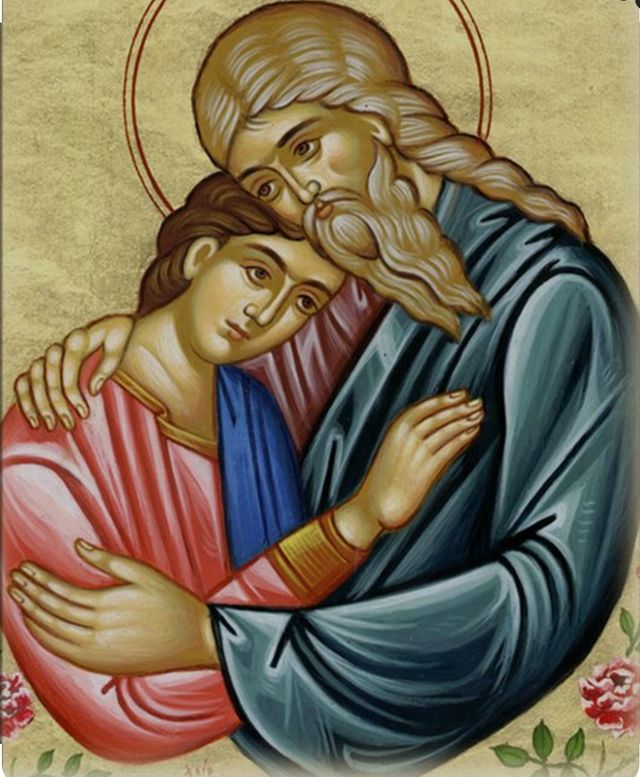
the Fourth Sunday of Lent
Gospel according to Luke 15:1-3, 11b-32
Now the tax collectors and sinners were all gathering around to hear Jesus. But the Pharisees and the teachers of the law muttered, “This man welcomes sinners and eats with them. Then Jesus told them this parable: “There was a man who had two sons. The younger one said to his father, ‘Father, give me my share of the estate.’ So he divided his property between them. Not long after that, the younger son got together all he had, set off for a distant country and there squandered his wealth in wild living. After he had spent everything, there was a severe famine in that whole country, and he began to be in need. So he went and hired himself out to a citizen of that country, who sent him to his fields to feed pigs. He longed to fill his stomach with the pods that the pigs were eating, but no one gave him anything. When he came to his senses, he said, ‘How many of my father’s hired servants have food to spare, and here I am starving to death! I will set out and go back to my father and say to him: Father, I have sinned against heaven and against you. I am no longer worthy to be called your son; make me like one of your hired servants.’ So he got up and went to his father. But while he was still a long way off, his father saw him and was filled with compassion for him; he ran to his son, threw his arms around him and kissed him. The son said to him, ‘Father, I have sinned against heaven and against you. I am no longer worthy to be called your son.’ But the father said to his servants, ‘Quick! Bring the best robe and put it on him. Put a ring on his finger and sandals on his feet. Bring the fattened calf and kill it. Let’s have a feast and celebrate. For this son of mine was dead and is alive again; he was lost and is found.’ So they began to celebrate. Meanwhile, the older son was in the field. When he came near the house, he heard music and dancing. So he called one of the servants and asked him what was going on. ‘Your brother has come,’ he replied, ‘and your father has killed the fattened calf because he has him back safe and sound.’ The older brother became angry and refused to go in. So his father went out and pleaded with him. But he answered his father, ‘Look! All these years I’ve been slaving for you and never disobeyed your orders. Yet you never gave me even a young goat so I could celebrate with my friends. But when this son of yours who has squandered your property with prostitutes comes home, you kill the fattened calf for him!’ ‘My son,’ the father said, ‘you are always with me, and everything I have is yours. But we had to celebrate and be glad, because this brother of yours was dead and is alive again; he was lost and is found.’”

Reflections
We are now in the fourth week of Lent. This Sunday is traditionally called “Laetare Sunday,” translated as “Rejoice, O Jerusalem!” (1) Our preparation for lent is not half-way over. The vestments for this Sunday are rose instead of purple, and the altar may be decorated with fresh flowers. These are ways in which we anticipate the coming of Jesus’ Paschal sacrifice and resurrection, and the signs that we intend to continue to dedicate ourselves to welcome Jesus who reconciled us with the Father and with each other. (2)
In the theme of reconciliation with the Father, the Bible passage of today refers to God the Father’s desire for those who have wandered far from Him to repent and to return. Jesus’ parable emphasizes that the Father’s love overpowers the weight of sin and has no bounds or measure for those that seek Him. This encouragement is a source of joy that should accompany us as we prepare to enter the next few weeks, remembering Christ’s passion. The color and fragrance of flowers and the beautiful songs remind us that our hope reaches beyond death’s door to eternity. Christ’s resurrection offers new vistas and new possibilities, and this is what we are to stop and celebrate today.
The context of the “Parable of the Prodigal Son” begins with Jesus having been invited to a festive meal with some tax collectors. Jesus accepted the invitation, the more so, because he was among those that needed to hear his message. Tax collectors were considered somewhat outcasts amongst the ordinary citizens, because they collaborated with the Roman authorities. They did “dirty work” collecting taxes for the Romans, contributing to the oppression of their own people group. (3) The Scribes and the Pharisees who gathered around Jesus, kept an eye on every word of His and every deed. Since they were looking to discredit Jesus, Him dining with “sinners” was an opportune example that they pointed at, implying that Jesus cannot be as holy, wise, or prophetic as his disciples purported Him to be—he can certainly not be the Son of God—as he declared about himself, if he could not distinguish between the sinners and the righteous, and lowered himself to have a common meal with those whom the Jewish nation considered to be real examples of sinners.
Therefore, Jesus told them this Parable of the Lost Son, as it is also known, along with the Parable of the Lost Sheep, and the Lost Silver Coins, each one of them an aspect that illustrates the reasons why Jesus, the Son of God, would not avoid sinners, but exactly go and seek them out in an attempt to help them return to the love of the Father. (4) Just how accurate His words were in describing the reason and appealing to the Scribes and the Pharisees themselves to think of their position, becomes evident from observing some telling details of the parable.
In a patriarchal society, such as it was during Jesus’ time, it was customary for the sons to help their father with all the work, whether management of servants, overseeing their work, or direct physical labor if required. (5) Upon the father’s death, the wealth would have been distributed among the sons in proportion, usually a larger amount being inherited by the older son, and a smaller, but comparable, portion of the inheritance received by the younger. In the parable, the younger son defies this custom and demands his inheritance from the father in advance. This could be considered an offence of disregard for his father’s wishes, setting himself in a favorable position against his elder brother, and acting as if his father was dead. We can infer that the younger son was willful and disrespectful in making the demand. Furthermore, he was reckless in dishonoring his obligations toward his family of origin.
Yet, the father did not deny him his portion of the inheritance. He showed good will and allowed the younger son to act as he pleased. The younger son then went far away from the father where he lived a lacklustre and reckless lifestyle and spent all the money away. As a consequence of his actions, he was left poor and destitute. His condition worsened to the point that he observed other servants in that country who had their affairs more together than he did. He envied them, and in his misery, he recalled that his father treated the servants well. He stared to feel remorse for his actions. Here he was, rich according to his background, but poor as consequence of his hotheaded decisions. He begged to be allowed to eat from the same pen as the pigs. This subsided his physical hunger but not his emotional pain and the shame and guilt he felt for having made foolish decisions.
In an instance of clarity, he got himself together and resolved to go back to his father. He knew what he had to do: “I will apologize and admit that I was wrong,” he said to himself. At once, he was on the road toward home.
However, his father, who was probably praying and waiting for him all this time, was already waiting for him. When the young man reached him, he went on his knees, and admitted: “Father, forgive me, for I have sinned...I am no longer worthy to be called your son.” (Luke, 15:21). His father held him, hugged him, and called for the best robes to be brought forth, a ring signifying that he is member of the family to be brought and put on his fingers, and the fat calf to be slaughtered for a celebration. Thus, as he showed remorse, and apologized, his father already had his mind made up. He forgave him immediately and was greatly rejoiced at his return.
Not so the elder brother, who has just returned from hard work and has witnessed the preparations for a feast. He became indignant and questioned his father’s judgement. He felt it was not fair to welcome this “sinner” with such funfair. It was necessary therefore for his father to explain: “My son…you are always with me, and everything I have is yours. But we had to celebrate and be glad, because this brother of yours was dead and is alive again; he was lost and is found.” (Luke 15:31-32).
The life Jesus was talking about was spiritual life. The eldest son in this case were the Scribes and the Pharisees who questioned why he would be wasting his time with ‘sinners” or better to say, questioned his judgement, and therefore his position. What Jesus is clarifying here is that was sent to heal the sinners and those of contrite heart because the Father does not want any one of them to be lost. He is the True Shepherd of Isreal, who will lay down His life for His sheep, so that none of them would be lost. but saved and have eternal life. With Jesus’ words, “I am the good shepherd. The good shepherd lays down his life for the sheep.” (John 10:11-18).
The Good News of today is that Jesus assures us of the Father’s tender love for each and every one of us. He knows us and calls us by our name (Isaiah 43:1; 6). When we go far from Him, he is there, waiting for us. He loves us and wants us to have life—eternal life. For we are His beloved children and belong to Him.
Sources
- New Advent Catholic Encyclopaedia (2023). Laetare Sunday. Retrieved from: www.newadvent.org. Accessed: March 27, 2025
- National Catholic Register (2022). Rejoice, Jerusalem: Laetare Sunday is Catholicism’s Best-Kept Little Secret. Retrieved from: www.ncregister.com Accessed: March 27, 2025
- Catholic Exchange (2022). The Pharisee and the Tax Collector. Retrieved from: https://catholicexchange.com. Accessed: March 27, 2025
- Pope Francis (2014). “Jesus Has Chosen Sinners…he Calls Everyone!” Retrieved from: www.patheos.com Accessed: March 27, 2025
- Harrington, D. J. (2025). The Truth About Jesus and Women. St. Anthony Messenger. Franciscan Media. Retrieved from: franciscanmedia.org Accessed: March 27, 2025
- Pope Francis (2027). God dreams big and ‘calls us by name,’ Pope Francis says. Retrieved from: www.thedialogarchive.org. Accessed: March 27, 2025